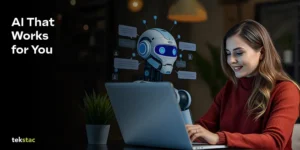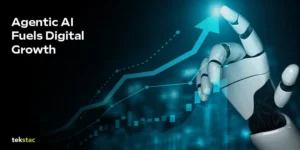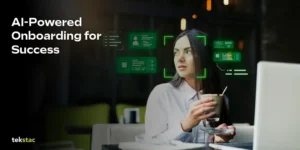Is AI Stealing Jobs? Understanding the Role of Human-AI Collaboration
February 14, 2025
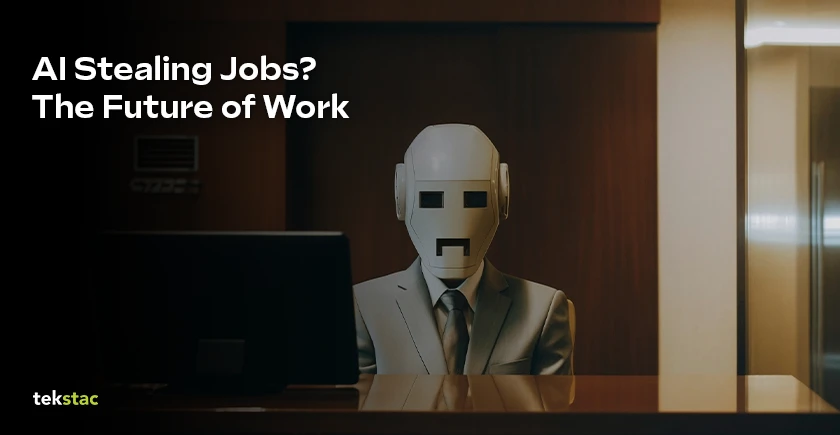
AI Stealing Jobs: Threat or Transformation?
The rise of artificial intelligence (AI) has sparked intense debates about the future of work. Will AI steal jobs and leave millions unemployed, or will it create new opportunities by augmenting human capabilities?
The reality lies somewhere in between, as AI is not just a job destroyer but also a job transformer. From IT organizations to healthcare, finance, manufacturing, and creative industries, AI is reshaping work and the workforce. Understanding its role and preparing for an AI-driven future is crucial for employees across various sectors.
The Fear of AI Stealing Jobs: How AI is Reshaping Workplaces
AI is not just another technology innovation- it’s a game-changer that extends beyond routine task execution. Unlike traditional automation, which focuses on rule-based and repetitive processes, AI introduces cognitive capabilities such as learning, decision-making, and problem-solving. This shift raises concerns about AI replacing human workers, particularly in industries like software development, customer service, data management, and much more.
According to a report by the International Monetary Fund (IMF), artificial intelligence is expected to impact nearly 40% of jobs globally, with advanced economies experiencing up to 60% exposure. This includes both potential job displacement and transformation.
A study by McKinsey Global Institute estimates that nearly 30% of jobs worldwide could be automated by 2030.
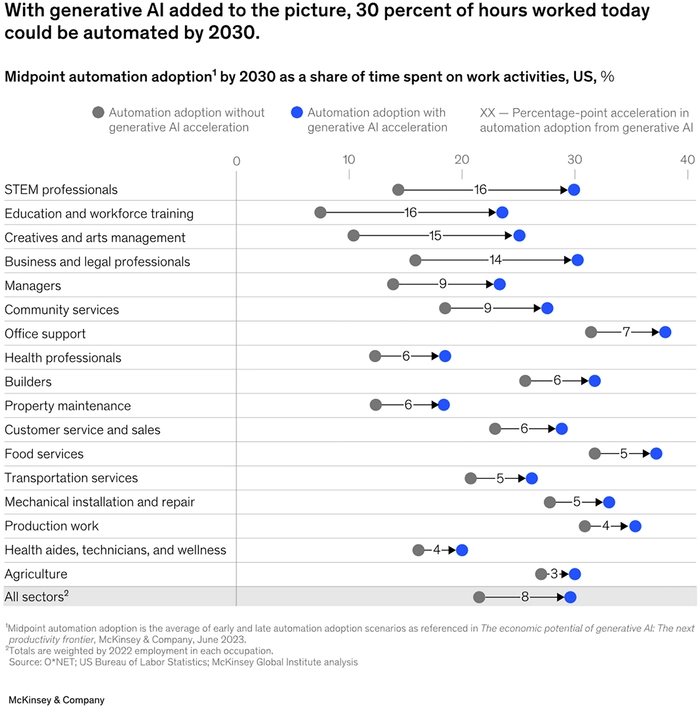
Source: McKinsey & Company
Roles such as manual testers in IT, basic customer service representatives, data entry clerks, and factory line workers are at high risk. AI-powered platforms can now generate code, perform automated testing, analyze customer inquiries, and even handle supply chain logistics faster than human workers.
However, history has shown that technological advancements often eliminate some jobs while creating new ones. The rise of e-commerce disrupted traditional retail but created new opportunities in logistics, digital marketing, and online customer experience. Similarly, AI is expected to generate demand for roles in AI ethics, machine learning operations (MLOps), AI-driven cybersecurity, and AI- product management.
AI Stealing Jobs or Enhancing Productivity? Human-AI Collaboration in Various Sectors
Instead of simply replacing workers, AI is evolving as a tool that enhances human productivity- it actively redefines how industries operate by introducing intelligence, adaptability, and decision-making capabilities. Unlike traditional automation, which primarily focuses on efficiency, AI introduces adaptive learning, predictive intelligence, and cognitive reasoning, enabling businesses to operate at an entirely new level.
From optimizing software development to revolutionizing customer experience and financial decision-making, AI is transforming the way work is done:
The synergy between human intelligence and artificial intelligence is already evident in various industries:
- IT & Software Development: AI-powered code generators like GitHub Copilot, assist developers by suggesting code snippets, debugging errors, and automating repetitive coding tasks.
- Customer Service: AI-driven chatbots handle basic customer queries, freeing up human representatives for more personalized and complex interactions.
- Cybersecurity: AI systems analyze security threats, detect anomalies, and automate incident response, helping security teams mitigate risks faster.
- Finance & Banking: AI-powered risk analysis, fraud detection, and automated financial advising help financial institutions improve accuracy and efficiency.
- Manufacturing & Logistics: AI-driven robots automate assembly lines, optimize supply chain management, and predict maintenance needs.
These examples highlight that AI is not inherently a threat but a complement to human expertise. The key lies in reskilling and adapting to an AI-first world with humans in the loop. Professionals who embrace AI and learn how to work alongside it will find new opportunities.
What AI Cannot Replace?
While AI excels at automating structured processes and is increasingly capable of mimicking critical thinking and creativity, it still struggles with deeper cognitive reasoning, emotional intelligence, and human intuition. Some roles that AI cannot easily replace include:
- AI & Machine Learning Engineers: These professionals design and refine AI models, ensuring they function correctly and ethically.
- Cybersecurity Specialists: AI can detect threats, but human security experts are needed to analyze, strategize, and implement defense mechanisms.
- Creative Professionals: Writers, artists, musicians, and designers bring originality, cultural understanding, and emotional depth that AI-generated content often lacks.
- Educators & Counselors: AI can provide learning tools, but human educators and counselors offer personalized guidance, mentorship, and emotional support.
By focusing on these uniquely human qualities, professionals across industries can position themselves in roles that AI cannot easily replace.
The Importance of Reskilling and Upskilling
As AI continues to evolve, professionals must develop new skills to remain relevant in the job market. Reskilling and upskilling will be essential for those seeking to transition into AI-driven roles. Some ways professionals and organizations can prepare include:
Strengthening AI & Tech Capabilities
- AI & Machine Learning Fundamentals: Understanding neural networks, deep learning, and AI algorithms to leverage AI-driven innovations in various industries.
- AI-Augmented Automation & Tools: Mastering AI-driven analytics, cloud platforms, and automation tools such as AWS, Azure, TensorFlow, and OpenAI’s models.
- Cybersecurity & AI Risk Management: Learning to work with AI-powered security tools while developing expertise in ethical hacking, threat detection, and data privacy.
- Data Literacy & AI-Driven Decision-Making: Becoming proficient in data analytics, AI-generated insights, and predictive modeling to make informed business decisions.
- MLOps & AI Deployment: Developing skills in machine learning operations (MLOps), model optimization, and responsible AI governance to ensure ethical and efficient AI applications.
Companies must also invest in upskilling programs, AI training, and certification courses to help employees adapt to these new demands.
AI Stealing Jobs or Creating Opportunities? The Rise of New Roles
Although AI will undoubtedly change the job landscape, it will also create new opportunities. Emerging roles that are growing due to AI advancements include:
- AI Prompt Engineers: Specializing in designing and refining prompts to improve the accuracy and relevance of AI-generated responses, ensuring better interaction between users and AI models.
- AI Chip Designers: Engineering specialized processors optimized for AI workloads, improving computational efficiency and enabling faster, more cost-effective AI model training and deployment.
- AI Ethics & Responsible AI Specialists: Focused on mitigating AI biases, ensuring transparency, and developing ethical frameworks to guide responsible AI implementation across industries.
- GenAI-Powered Content Strategists: Utilizing AI to generate, optimize, and personalize content while maintaining brand consistency and human creativity in marketing, publishing, and communications.
- Human-AI Interaction Designers: Creating seamless, intuitive AI-driven user interfaces and applications to enhance collaboration between humans and AI without compromising usability or trust.
- AI Trainers & Model Fine-Tuners: Enhancing AI performance by curating domain-specific training data, refining model accuracy, and reducing biases to improve real-world applicability.
- AI-Augmented Cybersecurity Specialists: Detecting and defending against AI-powered cyber threats, such as deepfakes and automated phishing attacks, using AI-driven security analytics and anomaly detection.
As AI continues to advance, professionals who stay ahead of these trends will secure their place in the evolving workforce.
Conclusion
AI is not here to steal jobs but to transform them. Human-AI collaboration offers a promising future where technology enhances efficiency while humans continue to provide creativity, strategic thinking, and leadership. The key to success lies in adaptation and lifelong learning, ensuring that we harness AI’s potential while preserving the irreplaceable qualities of human workers.
AI is reshaping industries by redefining job roles and skill requirements. Those who embrace AI and develop skills that complement technological advancements will thrive in the evolving job market. Instead of fearing AI, professionals across industries should focus on leveraging its capabilities to build a more innovative, efficient, and resilient future in a technology-driven world.

